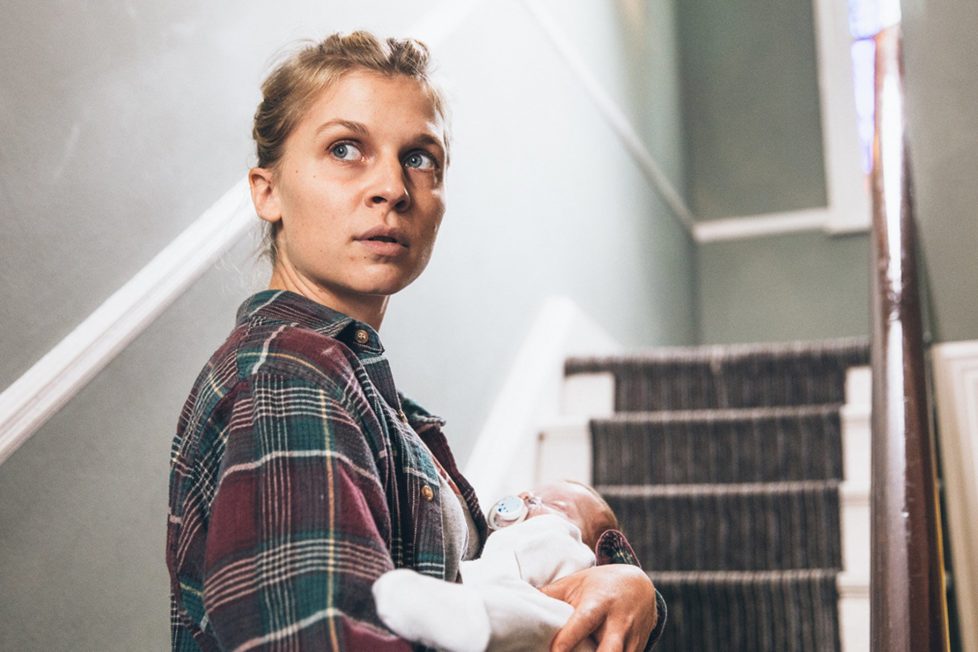THE ONES BELOW (2015)


To say The Ones Below is inspired by the films of Roman Polanski would be a gross understatement. Motherhood-inflected horror, the conflict between pairs of parents, and the strangeness of city-living (where one home’s stacked on top of another), all feature here. From Rosemary’s Baby (1968) to Carnage (2011), there’s barely a scene in which Polanski’s influence isn’t felt. In The Ones Below, director David Farr ensures the film’s real enough to be realistic but sets this against an eerily lingering camera. It’s always ready to pick out the single element in the frame that hints at the abnormality of the situation and the characters. Adem Ilhan’s lullaby of a score—taking inspiration from Krzysztof Komeda’s score for Rosemary’s Baby—only adds to this uneasy atmosphere.
As we see them move into a new apartment, Justin (Stephen Campbell Moore) and his pregnant partner Kate (Clémence Poésy) appear to be the perfect couple. Both have respectable careers, and they’re about to start a family. On the surface, the couple moving into the apartment below them appear to be in a similar situation. Jon (David Morrissey) is clearly a very successful businessman, and Theresa (Laura Birn) is pregnant with their first child—they even take their shoes off and leave them outside before entering their home. That detail can function as an example of harmless cleanliness and exactitude, or it could suggest a couple who are, to put it bluntly, a little odd. Unfortunately, any question over which has already been answered when Jon’s picked out by the camera in the background of an earlier shot. He’s picking up food from a restaurant at which Kate and Justin are eating, but he moves like a double agent and is obviously listening to what the other couple is saying. In other words, the couple who turn out to be sinister villains get signposted as such before we’re even introduced to them.
In an effort to get to know the couple living beneath them, Justin and Kate invite them to dinner. Over the course of the evening, it becomes clear that Jon’s an authoritarian figure, and Theresa deals with this by pouring wine down her throat whenever he’s not looking. The awkward tension builds and the two couples’ situations diverge. Kate was always hesitant about motherhood and put it off for a long time. Theresa and Jon, on the other hand, want nothing more than a child. The very notion that Kate could ever have felt differently to them on this issue is enough to anger and insult him. David Morrissey is given further opportunity to flex his pathological father-to-be acting skills when a series of barely believable coincidences lead to Theresa falling down the stairs that separate the two apartments and the two couples.
Farr’s idea seems to be that by conjoining the apartment block paranoia of The Tenant (1976) and the matriarchal anxiety of Rosemary’s Baby, something new and original can emerge. But with Theresa and Jon now tragically bereft of their unborn child, there’s little doubt as to where the action is heading. Blaming Kate for her fall, Theresa screams “You don’t deserve that thing inside you” at her when she and Justin venture downstairs the day after the fall. It’s an earth-shattering moment because it directly addresses the fears and doubts Kate was already harbouring. But her psychology after this event is never interrogated in any depth. Instead, thriller tropes are relied on more than ever, and the plot plays out as one would expect it to. Kate’s senseless actions and the continued piling up of coincidences never feel adequately explained away by the pressure and exhaustion Kate is obviously experiencing as a new mother. The moments that aren’t formulaic and predictable veer too far the other way, becoming ridiculous and counter to the broadly realistic world constructed by the director.
The thing is, Roman Polanski keeps you guessing. You can watch one of his films for the third time and still find yourself asking questions and looking closer in an effort to discover more. He’s a director whose work displays a unique thematic vision. That’s not to say other directors can’t play with his themes, but leaning on them too heavily, and not even doing anything particularly interesting with them, will lead to results like this. Predictable, flat and clichéd, Farr’s The Ones Below offers no space in which ideas can be explored and leaves no room for its characters to breathe.
starring: Clémence Poésy, David Morrissey, Stephen Campbell Moore, Laura Birn & Deborah Findlay.
